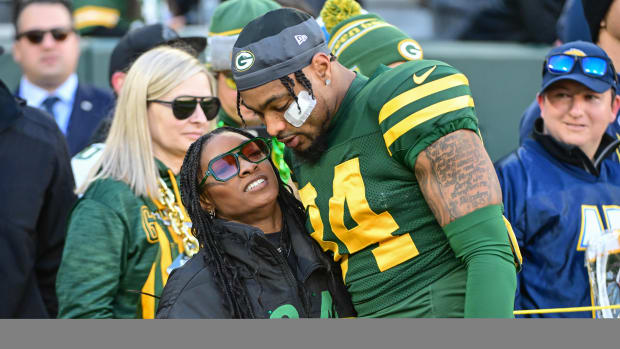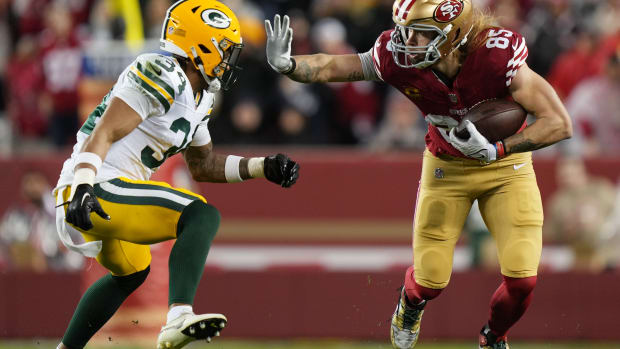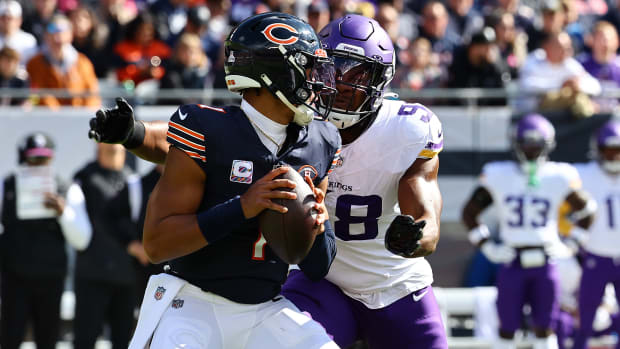Finding Another Bears Back Won't Cost Much
At one time, running backs gained 1,000 yards or in some cases 2,000 yards and they bought really expensive gifts for all of their offensive linemen.
Those poor old big guys in the trenches are always faceless without the spotlight of carrying the ball, get little respect for what they do and underpaid.
When Walter Payton came to the Bears, he gave the ball to his offensive linemen to spike the ball. A moment of fleeting glory for the big guy.
Now, because of the way the NFL has evolved, the linemen should be pooling their big bonus checks to help support the family of their starting running back.
It's so unfair.
The guy who has to carry the ball the most, takes hits from the biggest guys on the field and risks the most, gets paid the least.
Well, maybe it's not the least. Punters, long snappers and special teams players in general still average less. But place-kickers have an average annual salary of $2.828 million and running backs are being paid $2.412 million according to Spotrac.com figures.
The average pay for a player on offense in the league is $3.99 million a year because quarterbacks ($8.6 million) and wide receivers are so well paid ($3.47) million.
Talk about role reversal. Left tackles average more than quarterbacks now at $9.56 million, right tackles $6.46 million. Even guards ($3.2 million) and centers ($3.07 million) make more than backs now.
The average career for a running back in the league is now 2.5 years.
Here's a proposal: Hazard pay for running backs. The league or the teams or someone must award a bonus figure every year to backs based on number of carries.
Don't laugh and call it ridiculous.
The passer, the pass receiver, the pass protector must be protected. What about the guy who pass-protects, catches passes and runs the ball?
The Cowboys cut Ezekiel Elliott on Wednesday. Good backs are out of work everywhere.
This degradation of running back value has been going on gradually for years because of the increased emphasis on passing.
Now this all goes back to the departure of David Montgomery from Chicago after GM Ryan Poles wouldn't pay him more than an average annual salary of $6 million.
The city where Walter Payton once poured his soul into every play, whether he ran it or just blocked, was graced for four years with Montgomery, who had the same approach.
Sure, Montgomery wasn't the fastest back but he also had to put up with some really poor Bears offensive lines. He was playing for a franchise still without a 4,000-yard passer, a team founded in 1920. So defenses knew the run was coming and he still carried over 200 times every year.
If anyone should have valued effort from running backs, it's the Bears.
All the Bears needed to retain Montgomery in theory was $18 million and a cent over three years. They just paid out $21 million over three years for DeMarcus Walker, a pass rusher who never had more than 4 1/2 sacks in his five-year career until 2022 when he got seven sacks.
Surely they would get $18 million together. They spent more than $100 million to fix up the grounds and the building up at Halas Hall. What's another million?
The Detroit Lions paid Montgomery that $18 million over three years and now the Bears are down a starting running back who runs hard and picks up the tough yards, pass-blocks and catches passes. Now their defensive front can try to tackle Montgomery. Good luck with that.
The Bears have plenty of problems right now even though they had the most salary cap space when free agency started. They don't have a starting caliber right tackle.
They don't have a defensive line.
They have Khalil Herbert to run the ball but there have to be questions about his limits. He's had 232 rushing attempts in two years, or about Montgomery's regular workload for one year. He also hasn't been a good pass blocker or receiver like Montgomery.
No running back in the league with at least 93 carries averaged more than the 5.7 yards per carry like Herbert last year. What the big-play quarterback, Justin Fields, and big-play running back need as a complement is someone who can get the tough yards. They can use someone like Montgomery.
Poles said he wanted Montgomery, but letting him leave for the paltry sum of $18 million over three years doesn't say much for his word when he said the same thing about Roquan Smith and he was gone even faster than Montgomery.
Poles came to Chicago from a franchise where they have made a habit of discarding running backs like a fast food wrapper. The Kansas City Chiefs have had a different leading rusher each of the last four seasons.
This passes for cutting-edge thinking today.
So Poles better have a draft plan at running back for a tough, inside runner. It's not Travis Homer, the third-down back they just signed from Seattle.
Maybe he'll still scrounge one up in free agency.
If they wait, though, they can probably get one for about $15 an hour.
Twitter: BearDigest@BearsOnMaven





